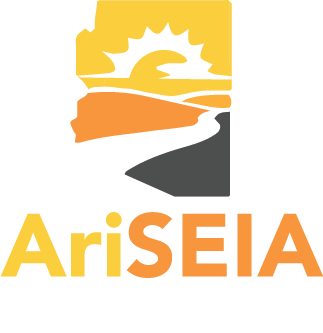|
Arizona Corporation Commission
1200 W. Washington Street Phoenix, AZ 85007 Re: Application of APS for Approval of Revised Resource Comparison Proxy, Docket No. E-01345A-22-0105 Madam Chair and Commissioners, Vote Solar, Solar United Neighbors, and the Arizona Solar Energy Industries Association (AriSEIA) urge you to support Arizona families and businesses who continue to face challenging economic circumstances by delaying the proposed 10% step down of Arizona Public Service’s (APS) Resource Comparison Proxy (RCP) rate for at least one year. The RCP Plan of Administration[1] requires APS to submit an RCP export rate annually for Commission approval and specifies that the RCP “may not be reduced by more than 10% each year.”[2] The Commission has the opportunity to provide consumers looking to save money on their energy bill with relief by postponing the up to 10% step down of the RCP. After several tumultuous years, Arizona families and businesses continue to face unusual economic challenges. Over the last year, consumers have experienced the largest increase in inflation rates in 40 years and a 36% increase in energy costs.[3] At the same time, manufacturing and supply chain issues are delaying delivery of solar panels and equipment and driving up prices, resulting in the highest prices for polysilicon since 2011.[4] As noted by APS in its Application, forecasted costs for grid-scale solar increased in 2022.[5] Rooftop solar is an important tool that ratepayers can utilize to help reduce their utility bills and increase energy resiliency at their home. As a result of these unprecedented hardships, many Arizona families and businesses hoping to go solar may find that, due to their own economic circumstances or market conditions beyond their control, it will be necessary to delay installing solar. If the RCP is adjusted downward by 10%, families and businesses who must wait until next year to install solar will see a significantly reduced return on their investment for 10 years. At its current value of $0.09405 cents per kWh, the cost associated with APS’s RCP rate is already lower than other ratepayer expenditures on solar resources. For example, APS recently received approval for its 2022 REST plan which includes $20 to 30 million in annual spending on its utility-owned rooftop solar program, Solar Communities, the closest proxy for a distributed solar installation.[6] The cost of this program includes the capital cost of a rooftop solar installation, which may include recovery of the utilities’ approved rate of return, and a bill credit for participating customers. The cost of the Solar Communities program amounts to approximately $0.147 per kWh over the 20-year lifetime of a solar installation, well above the current RCP rate paid to solar customers.[7] We respectfully request that the Commission reject the step down as proposed by APS and included within the Staff’s proposed order in an effort to support families and businesses facing challenging and unprecedented economic circumstances and provide them with an extended opportunity to capitalize on the power of the sun to reduce their energy bills. An amendment to the RCP step down is attached as Attachment A below. Thank you for your consideration of this important matter. Sincerely, Autumn T. Johnson Executive Director Arizona Solar Energy Industries Association (AriSEIA) [email protected] 520-240-4757 Bret Fanshaw Western Region Director Solar United Neighbors (SUN) [email protected] 602-962-0240 Kate Bowman Interior West Regulatory Director Vote Solar [email protected] 703-674-8637 ATTACHMENT A JOINT STAKEHOLDER PROPOSED AMENDMENT NO. 1 Purpose: This Amendment denies the step down authorized in the Decision to give property owners an additional year to install rooftop solar systems at the current export rate. The Commission recognizes that challenging and unforeseen economic circumstances experienced in the last few months may have forced many property owners who otherwise would have installed rooftop solar systems in 2022 to put plans on hold. The Commission also recognizes that the majority, if not the entirety, of the year 2022 will likely be characterized by supply chain disruptions, exorbitant inflation, and high energy costs, presenting reasonable grounds for the Commission to consider the year 2022 an exception to the standard RCP formula. Under this proposal, the Company will still be required to file an application for the step down in 2023. Page 5, Line 10 DELETE Approve INSERT Deny Page 5, Line 11 INSERT after “herein” The Commission recognizes that much of 2022 has subjected ratepayers to unforeseen economic hardships due to supply chain disruptions from COVID-19, high energy rates due to global events, and unprecedented inflation. Therefore, it is not appropriate to decrease the RCP at this time. Page 5, Line 14 DELETE $0.08465 INSERT $0.09405 **Make all conforming changes [1] See Appendix C, APS Application, (April 29, 2022) https://docket.images.azcc.gov/E000019056.pdf?i=1657141638108. [2] See Appendix H, Arizona Corporation Commission, Decision No. 76295, (Aug. 18, 2017), https://docket.images.azcc.gov/0000182160.pdf?i=1657139837798. [3] U.S. Bureau of Labor Statistics, Consumer Prices Up 8.6 percent over year ended May 2022, TED: The Economics Daily, (June 14, 2022), https://www.bls.gov/opub/ted/2022/consumer-prices-up-8-6-percent-over-year-ended-may-2022.htm. [4] Bloomberg News, Solar Material Price Jumps Most in 8 Months on Supply Woes, Bloomberg, (June 29, 2022), https://www.bloomberg.com/news/articles/2022-06-29/solar-panel-material-price-jumps-most-in-8-months-on-supply-woes. [5] APS Application, (April 29, 2022), page 4, lines 6 - 8, https://docket.images.azcc.gov/E000019056.pdf?i=1657141638108. [6] Arizona Corporation Commission, Decision No. 78583, (May 27, 2022), https://docket.images.azcc.gov/0000206888.pdf?i=1657141036380. [7] This estimate is based on a 6 kW system and a cost of $2.60 per watt, an 8.7% rate of return, annual production of 1,706 kWh/kW in the first year, and 0.5% annual panel degradation.
0 Comments
Leave a Reply. |
AriSEIA NewsKeep up with the latest solar energy news! Archives
July 2024
Categories
All
|
NEWS
See what AriSEIA is up to on the policy front.
The Arizona Solar Energy Industries Association (AriSEIA) is a 501(c)(6) non-profit trade association representing the solar, storage, and electrification industry, solar-friendly businesses, and others interested in advancing complementary technologies in Arizona. The group's focus is on education, professionalism and promotion of public policies that support deployment of solar, storage, and electrification technologies and renewable energy job growth and creation. |
FOLLOW Us |
Copyright © 2019 AriSEIA - All Rights Reserved

 RSS Feed
RSS Feed
